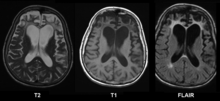
Back الخرف الجبهي الصدغي Arabic Demència frontotemporal Catalan Frontotemporale Demenz German Μετωποκροταφική άνοια Greek Demencia frontotemporal Spanish زوال عقل پیشانی گیجگاهی Persian Frontotemporaalinen dementia Finnish Démence fronto-temporale French Demenza frontotemporale Italian 前頭側頭型認知症 Japanese
| Frontotemporal dementia | |
|---|---|
 | |
| Brain MRI of a 65-year-old woman with frontotemporal dementia. Cortical and white matter atrophy of the frontal lobes is clear in all images. | |
| Specialty | Psychiatry, neurology |
| Causes | frontotemporal lobar degeneration |
Frontotemporal dementia (FTD), also called frontotemporal degeneration disease[1] or frontotemporal neurocognitive disorder,[2] encompasses several types of dementia involving the progressive degeneration of the brain's frontal and temporal lobes.[3] FTD is the second most prevalent type of early onset dementia after Alzheimer's disease.[citation needed] Men and women appear to be equally affected.[1] FTD generally presents as a behavioral or language disorder with gradual onset.[4] Signs and symptoms tend to appear in late adulthood, typically between the ages of 45 and 65, although it can affect people younger or older than this.[1] Currently, no cure or approved symptomatic treatment for FTD exists, although some off-label drugs and behavioral methods are prescribed.[1]
Features of FTD were first described by Arnold Pick between 1892 and 1906.[5] The name Pick's disease was coined in 1922.[6] This term is now reserved only for the behavioral variant of FTD, in which characteristic Pick bodies and Pick cells are present.[7][8] These were first described by Alois Alzheimer in 1911.[6] Common signs and symptoms include significant changes in social and personal behavior, disinhibition, apathy, blunting and dysregulation of emotions, and deficits in both expressive and receptive language.[9]
Each FTD subtype is relatively rare.[10] FTDs are mostly early onset syndromes linked to frontotemporal lobar degeneration (FTLD),[11] which is characterized by progressive neuronal loss predominantly involving the frontal or temporal lobes, and a typical loss of more than 70% of spindle neurons, while other neuron types remain intact.[12] The three main subtypes or variant syndromes are a behavioral variant (bvFTD) previously known as Pick's disease, and two variants of primary progressive aphasia (PPA): semantic (svPPA) and nonfluent (nfvPPA). Two rare distinct subtypes of FTD are neuronal intermediate filament inclusion disease (NIFID) and basophilic inclusion body disease (BIBD). Other related disorders include corticobasal syndrome (CBS or CBD), and FTD with amyotrophic lateral sclerosis (ALS).
- ^ a b c d Olney NT, Spina S, Miller BL (May 2017). "Frontotemporal dementia". Neurologic Clinics. 35 (2): 339–374. doi:10.1016/j.ncl.2017.01.008. PMC 5472209. PMID 28410663.
- ^ Diagnostic and statistical manual of mental disorders: DSM-5 (5th ed.). Arlington, VA: American Psychiatric Association. 2013. pp. 614–618. ISBN 978-0-89042-554-1.
- ^ "ICD-11 – Mortality and Morbidity Statistics". icd.who.int.
- ^ Sivasathiaseelan H, Marshall CR, Agustus JL, Benhamou E, Bond RL, van Leeuwen JE, et al. (April 2019). "Frontotemporal Dementia: A Clinical Review". Seminars in Neurology. 39 (2): 251–263. doi:10.1055/s-0039-1683379. PMID 30925617. S2CID 88481297.
- ^ Cite error: The named reference
Mikol2018was invoked but never defined (see the help page). - ^ a b Cite error: The named reference
Pearce2003was invoked but never defined (see the help page). - ^ Ropper AH, Samuels MA, Klein JP (2019). Adams and Victor's Principles of Neurology (eleventh ed.). McGraw Hill. p. 1096. ISBN 978-0-07-184262-4.
- ^ Cite error: The named reference
Cardarelli2010was invoked but never defined (see the help page). - ^ "Frontotemporal dementia". Johns Hopkins Medicine. 2024. Retrieved 23 March 2024.
- ^ Borroni B, Graff C, Hardiman O, Ludolph AC, Moreno F, Otto M, et al. (March 2022). "FRONTotemporal dementia Incidence European Research Study-FRONTIERS: Rationale and design". Alzheimer's & Dementia. 18 (3): 498–506. doi:10.1002/alz.12414. PMC 9291221. PMID 34338439.
- ^ Cite error: The named reference
Hofmannwas invoked but never defined (see the help page). - ^ Chen I (June 2009). "Brain Cells for Socializing". Smithsonian. Retrieved 30 October 2015.
© MMXXIII Rich X Search. We shall prevail. All rights reserved. Rich X Search